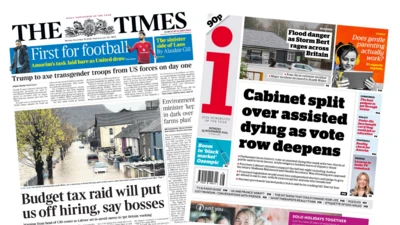We've updated our Privacy and Cookies Policy
We've made some important changes to our Privacy and Cookies Policy and we want you to know what this means for you and your data.
Police taking 'excessive' data from mobile phones
Image source, Getty Images
Police in England and Wales are taking "excessive" amounts of personal data from smartphones during investigations, the UK's data watchdog has warned.
Taking too much data may deter people from reporting crime or assisting the police, Information Commissioner Elizabeth Denham said.
Her report on police mobile phone data extraction (MPE) calls for a "statutory code of practice" for police.
An investigation into MPE in Scotland and Northern Ireland continues.
'Penetrative insights'
In some cases, police ask for data from a witness or victim's smartphone, not just the suspects' devices.
The Information Commissioner's Office (ICO) started its investigation following concerns police forces were inconsistent in how they collected data and many took "an overly wide approach to extracting data".
The says mobile phones "reveal patterns of our daily personal and professional lives and enable penetrative insights into our actions, behaviour, beliefs, and state of mind".
Taking data without "meaningful engagement" with witnesses and victims of crime "risks dissuading citizens from reporting crime", said Ms Denham.
Rape investigations
Campaign group Big Brother Watch said the report confirmed its "long-held view... the police's default approach to demanding digital strip-searches of victims of crime is unlawful, damaging and needs to end".
The group has published its own report about mobile phone data collection in rape investigations.
Its research suggested police investigations were dropped when the alleged victims refused to hand over their mobile phone data.
The group submitted Freedom of Information requests to 22 police forces in England and Wales.
'Dangerous approach'
It found officers had asked for the complainant's mobile phone data in 84 sexual assault cases.
And every one of the 14 of those in which the complainant had declined had then been dropped by police.
"People who report sexual offences want to provide the relevant evidence but are routinely told they have to subject to a full phone extraction, give up social-media accounts and often more data," Big Brother Watch said.
"This is an incredibly dangerous approach."
Top Stories
More to explore
Most read
Content is not available








